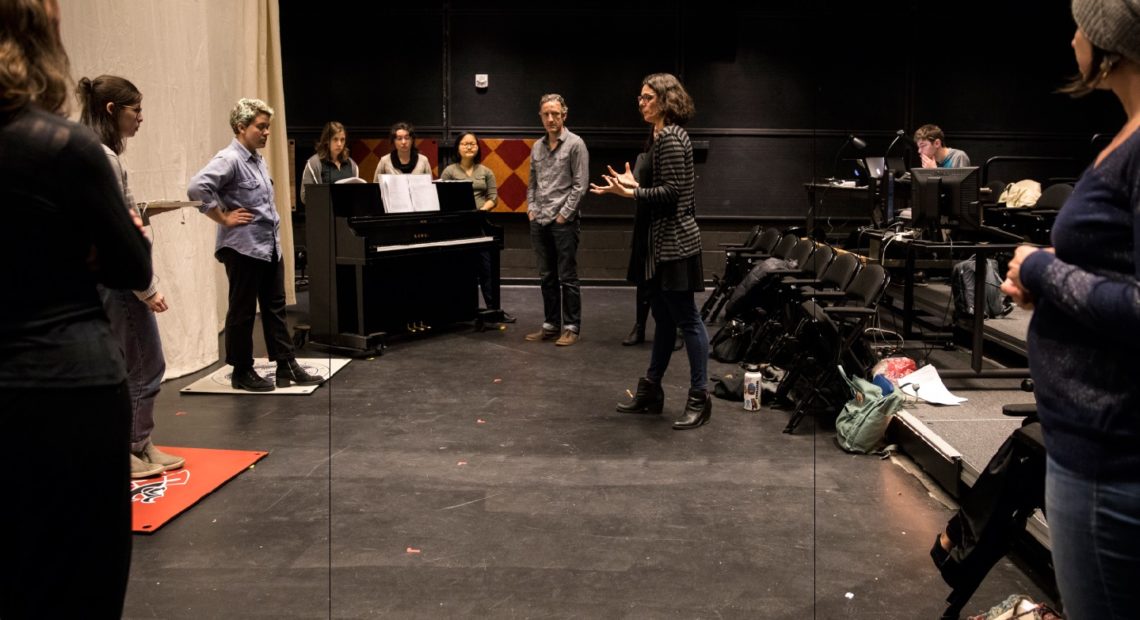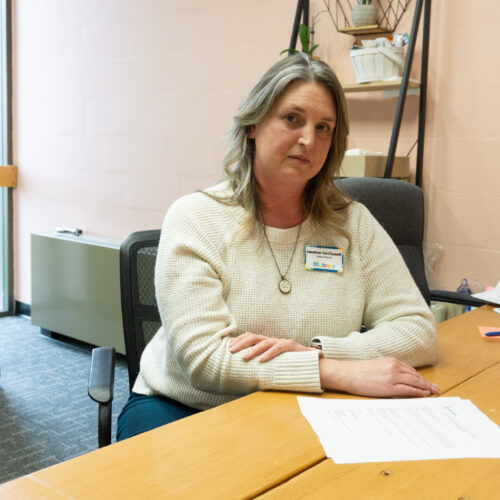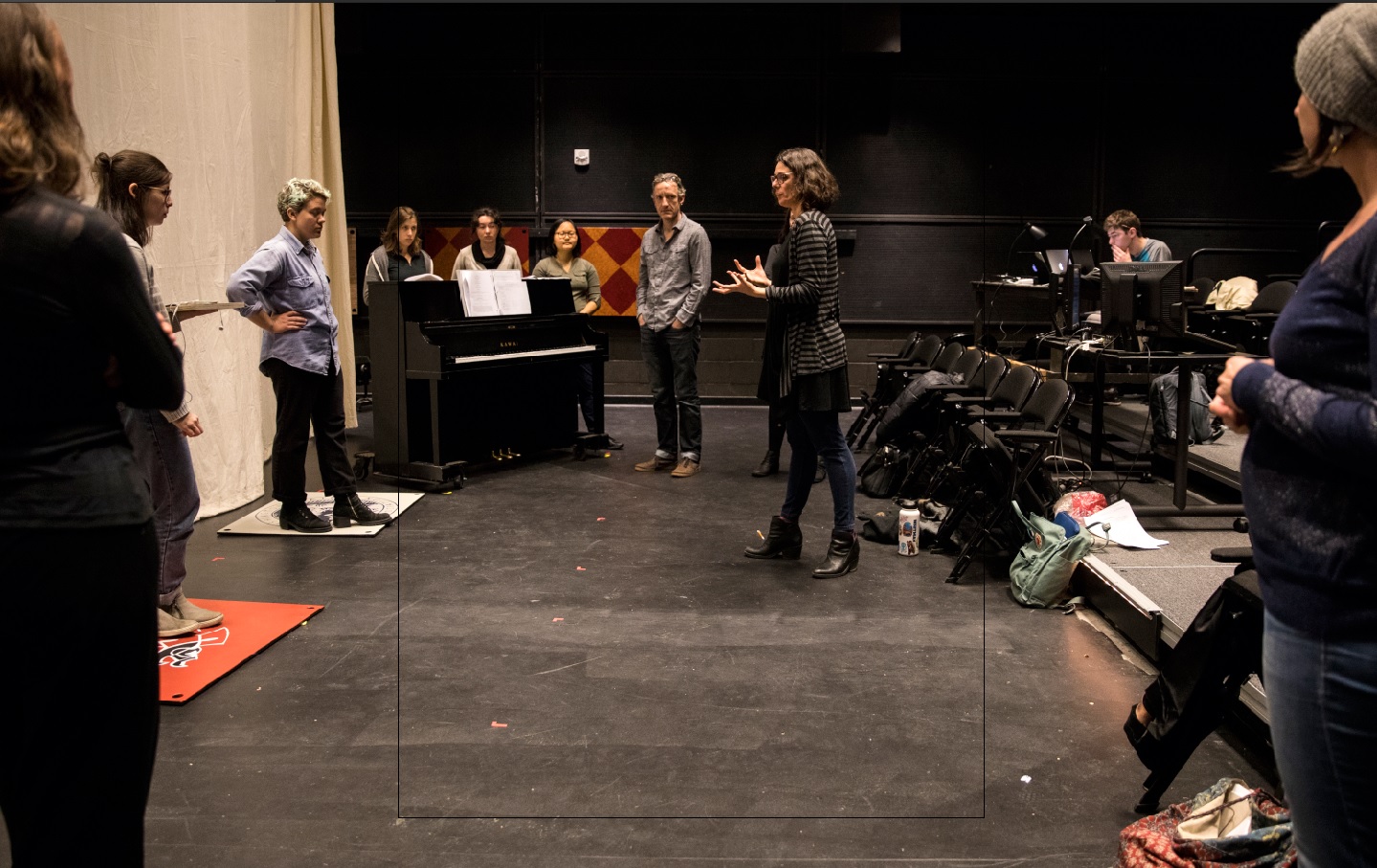
Acting And Activism: Whitman College Play Explores Community Impact Of Immigration
Read On
Whitman College’s Because You Are Here is community theater, but not in the way we usually think of it.
Instead of community members coming together to perform a stage classic, the student performers in this production met with members of the Walla Walla community—particularly the migrant population—to learn their stories and bring them to life. In four performances over an early December weekend, the cast did just that.
Ten students joined assistant professor of theater Jessica Cerullo and social choreographer and performance artist Tia Kramer at the beginning of the fall semester to devise what has become Because You Are Here.
For the hour-long production, the students along with Kramer and Cerullo interviewed about 35 people in Walla Walla ranging from a recent high school graduate to people in their 60s. Ten of those interviews became the script of the play.
The interviewees are “people with a history and knowledge of community activism,” Kramer said.
With that activism in mind, the students crafted the interviews to tell stories from a population that has been under-served and underrepresented in theater and even in archival materials, according to the creators. In tackling this project, big questions arose.
“What does the community want us to say,” Kramer said. “Not what we as academics want to say. What right do I have to do this work?”
Kramer expressed a sentiment shared between her and the students involved.
“We have to use our skills and talents to do the right thing,” she said.
Seniors Madeline Gold and Sabina Rogers are two of the 10 students in the production and the class that led to it. Like Kramer and Cerullo, their interests aren’t limited to just theater or just politics.
“This is a class like no other,” Gold said. “You have to bring your whole self. You don’t get that in other classes.”
While Whitman College’s liberal arts-based structure allows for unusual courses, this semester challenged students in ways they weren’t expecting.
“This is lived and embodied, like stepping into fear,” Rogers said. “I’m always asking, ‘Am I doing this right?’ There were a lot of barriers to push through.”
Less than a week before the show opens, the script was still evolving.
“We’re writing up to the moment and feel like we can pull this off,” said music director Gary Grundei, comparing the show to late night television.
The comparisons don’t end with just the writing process. Part of what makes the show unique is how the students have embraced the ever-changing and updating political climate. Even for the experienced Grundei, there have been surprises.
“We have to step into that charged space. I really feel like that’s what theater is charged to do,” Grundei said.
The space, specifically the physical space, is the Friemann Studio Theatre inside Whitman’s Harper Joy Theatre. The play will use all the area possible for good reason.
“There’s a feeling of honest, direct address and a fourth wall break that makes sense,” Grundei said. “There’s something lost without that leap. It’s truthful and honest on a microscopic level.”
A need for honesty came with the project from the beginning, whether in gathering the stories that went into the play or in working with castmates.
“You have to navigate how much is about you and how much is about the group. You have to learn when to step in or step back,” Rogers said.
When it comes time to perform in front of the audience, the cast will all have to step up. Unlike many plays, Because You Are Here isn’t something that can be left behind after a performance, those involved said.
“There’s a balance to doing justice to the work,” Rogers said. “I don’t think distance works. My professionalism is tied with my emotionality.”
Gold said she has plans for the play following the closure of the production, as it is part of her senior thesis. For the audience and the community at large, Because You Are Here will live on in another way.
“We’ve taken the audio interviews and created a phone tree,” Cerullo said.
Kramer and Cerullo culled through the hours of audio and arranged them into subjects such as “belonging,” “invisibility” and “community.” Called Hear Here, the phone tree will be available on-site in a special two-person booth, which creates a sense of a conversation according to Cerullo, and as a traditional call-in line so that anyone with a phone can hear the stories told.
It’s just one way in which the members of the production kept connected to the community throughout the last few months.
“We don’t take that lightly,” Rogers said. “Relationships don’t end at the end of the interview. We had an emphasis on the process over the production.”
But even with the audio available, some relationships weren’t entirely captured. Gold told of one interview held in Spanish. During the interview, she said, some listeners who don’t speak Spanish were in tears.
“There are just some things you can’t explain in words,” she said,
For Gold, Rogers, Cerullo, Kramer and all who participate, Because You Are Here has been a lesson in becoming more than just a community partner. Their call to action reached at least 400 people, as each of the four shows sold out the 100-seat Friemann Studio Theatre. The plays asks the audience and anyone who uses Hear Here to listen first, and then act.
“There’s no one right way to be an activist,” Rogers said. “Use what you are good at and love to be an activist.”
Visit Hear Here or call (509) 213 1223
Related Stories:

Why affordable housing providers say they’re facing an ‘existential’ crisis
Affordable housing providers across the Northwest have been contending with rising insurance premiums — and, in some cases, getting kicked off their plans altogether.

Head Start atiende a 15.000 niños en Washington y su oficina regional acaba de cerrar
La oficina regional de Head Start en Seattle se enteró de que cerraba la primera semana de abril. El cierre de esa oficina, así como de al menos otras cuatro, se produjo en medio de despidos masivos en la agencia matriz de Head Start, el Departamento de Salud y Servicios Humanos.

Washington’s state library just lost federal funding — here’s what that means
Heather VanTassell, director of the Walla Walla Public Library, is worried about federal cuts to the Washington State Library. (Credit: Susan Shain / NWPB) Listen (Runtime 1:00) Read Both the















